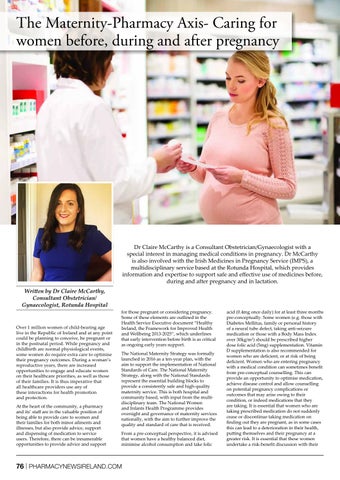The Maternity-Pharmacy Axis- Caring for women before, during and after pregnancy
Dr Claire McCarthy is a Consultant Obstetrician/Gynaecologist with a special interest in managing medical conditions in pregnancy. Dr McCarthy is also involved with the Irish Medicines in Pregnancy Service (IMPS), a multidisciplinary service based at the Rotunda Hospital, which provides information and expertise to support safe and effective use of medicines before, during and after pregnancy and in lactation. Written by Dr Claire McCarthy, Consultant Obstetrician/ Gynaecologist, Rotunda Hospital
Over 1 million women of child-bearing age live in the Republic of Ireland and at any point could be planning to conceive, be pregnant or in the postnatal period. While pregnancy and childbirth are normal physiological events, some women do require extra care to optimise their pregnancy outcomes. During a woman’s reproductive years, there are increased opportunities to engage and educate women on their healthcare priorities, as well as those of their families. It is thus imperative that all healthcare providers use any of these interactions for health promotion and protection. At the heart of the community, a pharmacy and its’ staff are in the valuable position of being able to provide care to women and their families for both minor ailments and illnesses, but also provide advice, support and dispensing of medication to service users. Therefore, there can be innumerable opportunities to provide advice and support
for those pregnant or considering pregnancy. Some of these elements are outlined in the Health Service Executive document “Healthy Ireland, the Framework for Improved Health and Wellbeing 2013-2025”, which underlines that early intervention before birth is as critical as ongoing early years support. The National Maternity Strategy was formally launched in 2016 as a ten-year plan, with the aim to support the implementation of National Standards of Care. The National Maternity Strategy, along with the National Standards represent the essential building blocks to provide a consistently safe and high-quality maternity service. This is both hospital and community based, with input from the multidisciplinary team. The National Women and Infants Health Programme provides oversight and governance of maternity services nationally, with the aim to further improve the quality and standard of care that is received. From a pre-conceptual perspective, it is advised that women have a healthy balanced diet, minimise alcohol consumption and take folic
76 | PHARMACYNEWSIRELAND.COM
acid (0.4mg once daily) for at least three months pre-conceptually. Some women (e.g. those with Diabetes Mellitus, family or personal history of a neural tube defect, taking anti-seizure medication or those with a Body Mass Index over 30kg/m2) should be prescribed higher dose folic acid (5mg) supplementation. Vitamin D supplementation is also recommended for women who are deficient, or at risk of being deficient. Women who are entering pregnancy with a medical condition can sometimes benefit from pre-conceptual counselling. This can provide an opportunity to optimise medication, achieve disease control and allow counselling on potential pregnancy complications or outcomes that may arise owing to their condition, or indeed medications that they are taking. It is essential that women who are taking prescribed medication do not suddenly cease or discontinue taking medication on finding out they are pregnant, as in some cases this can lead to a deterioration in their health, putting themselves and their pregnancy at a greater risk. It is essential that these women undertake a risk-benefit discussion with their


































